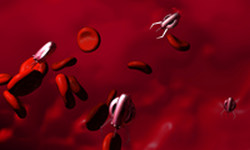The molecular mating dance
Some oligomers, chain-structured molecules consisting of a few repeating units, spontaneously fold into three-dimensional conformations in solutions. Such foldamers have now been produced synthetically and are proving an excellent model with which to study protein folding mechanisms. More recently, some of these foldamers have shown exciting ultra-fast electron transport ability via a rapid exchange mechanism. This property could provide a basis for molecular electronics and nanomachines. EU funding supported the detailed investigation of rigid, rod-like, helically folded aromatic amide oligomers of very large size. The project 'Aromatic foldamers for single molecule electronics' (FOSIMEL) synthesised and functionalised these foldamers in various solvents and studied them in chloroform, chloroform‒acetone mixtures, and chloroform‒acetonitrile mixtures. The team's previous work had reported on incorporation of rod-shaped 'guests' into helical hosts. In the present study, the researchers extended this by investigating the winding or threading rate constants of host-guest formations in which one end is stoppered. The hypothesis was that, in varying polarity of solvents, the unstoppered end will thread itself into the helix. Investigators prepared the foldamer guests with both ends stoppered as the reference condition for which only winding of the host around them can occur. The team then used nuclear magnetic resonance spectra to study host-guest complex formation and kinetics. Scientists demonstrated that both molecular conformation and solvation play critical roles in the formation of helix - rod host - guest complexes. FOSIMEL has laid the foundations on which to build a deeper understanding of foldamer structure and function. Such understanding will improve our ability to manipulate and control foldamers, opening the door to design of innovative nanomachines. In parallel, it will provide a novel tool with which to investigate biological processes.



